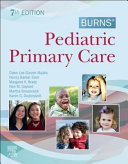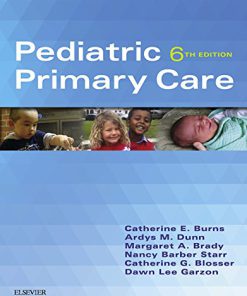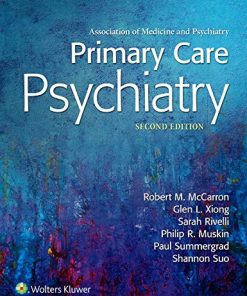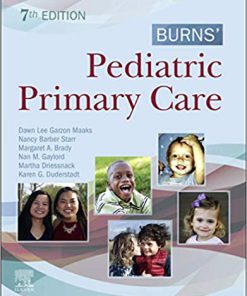(EBook PDF) Burns’ Pediatric Primary Care 7th Edition by Dawn Lee Garzon 0323597149 9780323597142 full chapters
$50.00 Original price was: $50.00.$25.00Current price is: $25.00.
Burns’ Pediatric Primary Care 7th Edition by Dawn Lee Garzon – Ebook PDF Instant Download/DeliveryISBN: 0323597149, 9780323597142
Full download Burns’ Pediatric Primary Care 7th Edition after payment.

Product details:
ISBN-10 : 0323597149
ISBN-13 : 9780323597142
Author: Dawn Lee Garzon
Get a comprehensive foundation in children’s primary care! Burns’ Pediatric Primary Care, 7th Edition covers the full spectrum of health conditions seen in primary care pediatrics, emphasizing both prevention and management. This in-depth, evidence-based textbook is the only one on the market written from the unique perspective of the Nurse Practitioner. It easily guides you through assessing, managing, and preventing health problems in children from infancy through adolescence. Key topics include developmental theory, issues of daily living, the health status of children today, and diversity and cultural considerations. Updated content throughout reflects the latest research evidence, national and international protocols and standardized guidelines. Additionally, this 7th edition been reorganized to better reflect contemporary clinical practice and includes nine new chapters, revised units on health promotion, health protection, disease management, and much, much more!
Burns’ Pediatric Primary Care 7th Table of contents:
Unit I. Influences on Child Health and Child Health Assessment
1. Health Status of Children: Global and National Perspectives
Global Health Status of Children
Progress on the Millennium Development Goals
Health Status of Children in the United States
Food and Housing Insecurity and Effect on Children’s Health
Addressing Children’s Health in the United States
Adverse Childhood Events and Impact on Child Health Outcomes
Role of Primary Care Providers for Improving Child Health
2. Unique Issues in Pediatrics
Two-Generation or Dual Patient
Looking Through a Developmental Lens
Parents, Families, and Behavioral Economics
Early Investment in Lifelong Health
Health Literacy
Transitioning to Adult Care
3. Genetics and Genomics : The Basics for Child Health
Basic Principles of Genetics
Genetics and Diseases
Patterns of Inheritance
Epigenetics
Integration of Basic Genetics and Genomics into Pediatric Primary Care
Ethical Issues
4. Environment and Child Health
Introduction
Principles for Understanding Children’s Environmental Health
Children’s Increased Risk for Environment-Related Illness
Approach to Management of Environmental Health Risks
Additional Resources
5. Child and Family Assessment
Child Assessment
Family Assessment
Additional Resources
6. Cultural Considerations for Pediatric Primary Care
Culture
Immigrant Children, Refugees, and International Adoptees
Overseas Health Assessment
Domestic Health Assessment
Mental Health Assessment
Internationally Adopted Children
Cultural Beliefs and Healing Practices
Additional Resources
7. Children With Special Health Care Needs
Identifying the Population
Levels of Complex Care
Components of Care
Care Coordination
Additional Resources
Resources for Families
Unit II. Child Development
8. Principles of Developmental Management of Children
Developmental Principles
Theories of Child Development
Theories of Family and Parent Development
Cultural Influences on Development
Management Strategies in Child Development
Concerns about Delayed Development and Developmental Red Flags
Additional Resources
9. Developmental Management of Newborns
Standards of Care
Anatomy and Physiology
Pathophysiology
After Stabilization
Management Strategies
Early Discharge and Follow-up
Common Neonatal Conditions
Head, Face, and Eye Conditions
Sudden Unexpected Infant Death
10. Developmental Management of Infants
Infant Mortality
Growth
Body Systems Maturation
Infant Development
Developmental Assessment of Infants
11. Developmental Management of Early Childhood
Development of Early Childhood
Developmental Assessment of Early Childhood
Anticipatory Guidance for Early Childhood
Common Developmental Issues in Early Childhood
Developmental Red Flags in Early Childhood
12. Developmental Management of Middle Childhood
Developmental Approach to Health Assessment and Health Promotion for Middle Childhood
Developmental Assessment of Middle Childhood
Common Developmental Issues for Middle Childhood
Overview of the Preventive Health Visit in Middle Childhood
13. Developmental Management of Adolescents and Young Adults
Adolescent and Young Adult Development
Developmental Screening and Assessment
Anticipatory Guidance During Adolescence
Phases of Adolescence
Common Developmental Issues for Adolescents
Unit III. Child Health Supervision: Health Promotion and Health Protection
14. Introduction to Health Promotion and Health Protection
Pediatric Nurse Practitioners—Then and Now
Pediatric Primary Care
The Pediatric Medical Home/Neighborhood
Bright Futures—Health Promotion and Preventive Care Initiative
Primary Care Versus Primary Prevention
Section A. Behavioral-Mental Health Wellness
15. Behavioral and Mental Health Promotion
Mental Health Foundations
Assessment of Mental Health
Mental Health Management Strategies
Behavioral Issues
Parenting Challenges and Special Circumstances
Section B. Biophysical Health Management
16. Breastfeeding
Breastfeeding Recommendations
Hospital-Based Support
Benefits of Breastfeeding
Contraindications to Breastfeeding
Stages of Milk Production
Characteristics of Human Milk
Anatomy and Physiology
Assessment of the Breastfeeding Dyad
Positions for Breastfeeding
Dynamics of Breastfeeding
Clinical Indications of Successful Breastfeeding
Maternal Nutritional Needs During Breastfeeding
Medications for Breastfeeding Mothers
Returning to Work
Common Breastfeeding Problems
17. Nutrition
Pediatric Dietary Guidelines
Nutritional Requirements and Dietary Reference Intakes
Assessment of Nutritional Status
Management Strategies for Optimal Nutrition
Altered Patterns of Nutrition in Children
Controversies in Pediatric Nutrition
18. Elimination
Normal Patterns of Elimination: Bowel and Urinary
Assessment of Patterns
Management Strategies for Normal Patterns
Altered Patterns of Elimination: Bladder and Bowel Dysfunction
19. Physical Activity and Sports for Children and Adolescents
Physical Activity: Overview
Promoting Physical Activity: Guidelines and Standards
Health Benefits of Physical Activity
Physical Activity and Children With Special Health Care Needs
Special Consideration: Atlantoaxial or Atlanto-Occipital Instability
Strategies to Support Physical Activity for Children and Adolescents
Considerations of Climate and Environment
Recreational Activities: Safety Issues
Performance Enhancing Nutrition and Supplements
The Preparticipation Sports Physical Examination for Sports
Evaluation and Management of Sports Participation for Athletes With Chronic Health Conditions
High-Risk Conditions for Sports Participation
20. Sleep
Sleep-Wake Cycle and Health
Electronic Devices and Sleep Problems
American Academy of Pediatrics Recommendations to Promote Adequate Sleep in Children
Normal Sleep Stages and Cycles
Assessment of Sleep
Sleep in Children With Developmental and Neurologic Conditions
ADHD
Strategies for Prevention and Management of Sleep Problems
Common Sleep Problems
Chronic Health Conditions and Dyssomnias
21. Sexuality, Sex, and Gender Identity
Standards
Patterns of Sexuality
Assessment of Patterns of Sexual Development
Management Strategies
Section C. Health Protection–Focused Care
22. Immunizations
Vaccine Preventable Diseases
Understanding Vaccines
Immunization Schedules in the United States
Inactivated Vaccines
23. Dental Health and Oral Disorders
Dental Care Standards and Guidelines
Normal Growth and Development
Performing the Oral Examination
Aberrations in Primary Tooth Eruption and Gums
Professional Dental Care
Dental Health Education
Bacterial Diseases of the Mouth
Viral Diseases of the Mouth
Idiopathic Oral Conditions
Lifestyle Choices That Affect Dental Health
Dental Care for Children With Special Health Care Needs
24. Injury Prevention and Child Maltreatment
Unintentional Injuries
Intentional Injuries
Violence
Common Childhood Conditions and Disorders
Section A. Introduction to Child Disease Management
25. Key Concepts, Assessment, and Management of Children With Acute or Chronic Disease
Key Concepts in Disease Management of Children
Assessment and Management of Children with Acute or Chronic Illnesses
26. Prescribing Medications in Pediatrics
National Safety Goals Regarding Prescribing Medications
Regulation and Safety of Pharmaceuticals
Guidelines for Writing a Prescription
General Prescribing Guidelines
Other Factors to Consider in Medication Management
27. Complementary Medicine in Pediatric Primary Care With an Introduction to Functional Medicine
Standards and Guidelines
Use of Complementary Therapies by Children and Adolescents
Scientific Studies of Complementary Medicine Therapies
Integrating Complementary/Integrative and Functional Medicine into Pediatric Primary Care
Common Complementary Therapies for Some Health Conditions
28. Pediatric Pain and Fever Management
Pediatric Pain Management
Overview of Pain
Factors Influencing Pediatric Pain Management
Barriers to Effective Pain Management
Pain Assessment
Management of Pediatric Pain
Partnership in Care
Overview of Pediatric Fever
Factors Influencing Pediatric Fever Management
Fever Assessment
Management of Pediatric Fever
Fever Without Focus in Infants and Young Children
Fever of Unknown Origin
Section B. Disease Management
29. Perinatal Conditions
Pathophysiology
Common Neonatal Conditions
30. Neurodevelopmental, Behavioral, and Mental Health Disorders
Assessment and Management of Behavioral Health Disorders
Common Behavioral Health Disorders
31. Infectious Diseases
Pathogenesis of Infectious Diseases
Clinical Findings
Diagnostic Aids
General Management Strategies
Prevention of Infection Through the Use of Vaccines
Infections in Children in Child Care Settings
Specific Viral Diseases
Infectious Agents Used in Bioterrorism
32. Congenital and Inherited Disorders
Genetics Referral
Creating an Emergency Plan
33. Atopic, Rheumatic, and Immunodeficiency Disorders
Pathophysiology and Defense Mechanisms
Atopic Disorders
Rheumatologic Disorders
Pediatric Vasculitis
Pediatric Primary Immunodeficiency Disorders
34. Dermatologic Disorders
Anatomy and Physiology
Pathophysiology and Defense Mechanisms
Assessment of the Skin and Subcutaneous Tissue
Management Strategies
Bacterial Infections of the Skin and Subcutaneous Tissue
Fungal Infections of the Skin
Viral Infections of the Skin
Infestations of the Skin
Allergic and Inflammatory Skin Conditions
Drug Eruptions
Vascular Skin Conditions
Papulosquamous Eruptions of the Skin
Congenital Skin Conditions
Cutaneous Manifestations of Underlying Disease
Hair Loss
Body Modifications
People also search for Burns’ Pediatric Primary Care 7th:
burns’ pediatric primary care 7th edition pdf free
burns’ pediatric primary care 8th edition pdf free
burns’ pediatric primary care 8th edition
burns’ pediatric primary care 8th edition test bank
burns’ pediatric primary care 7th edition test bank
Tags:
Burns,Pediatric Primary,Care,Dawn Lee Garzon
You may also like…
Uncategorized
Medicine - Nursing
Promoting Health: The Primary Health Care Approach 7th Edition Jane Taylor
Uncategorized
Uncategorized
Relationships & Lifestyle - Pregnancy & Childcare
Medicine - Health-Related Professions
Promoting Health The Primary Health Care Approach 7th Edition Jane Taylor
Uncategorized











